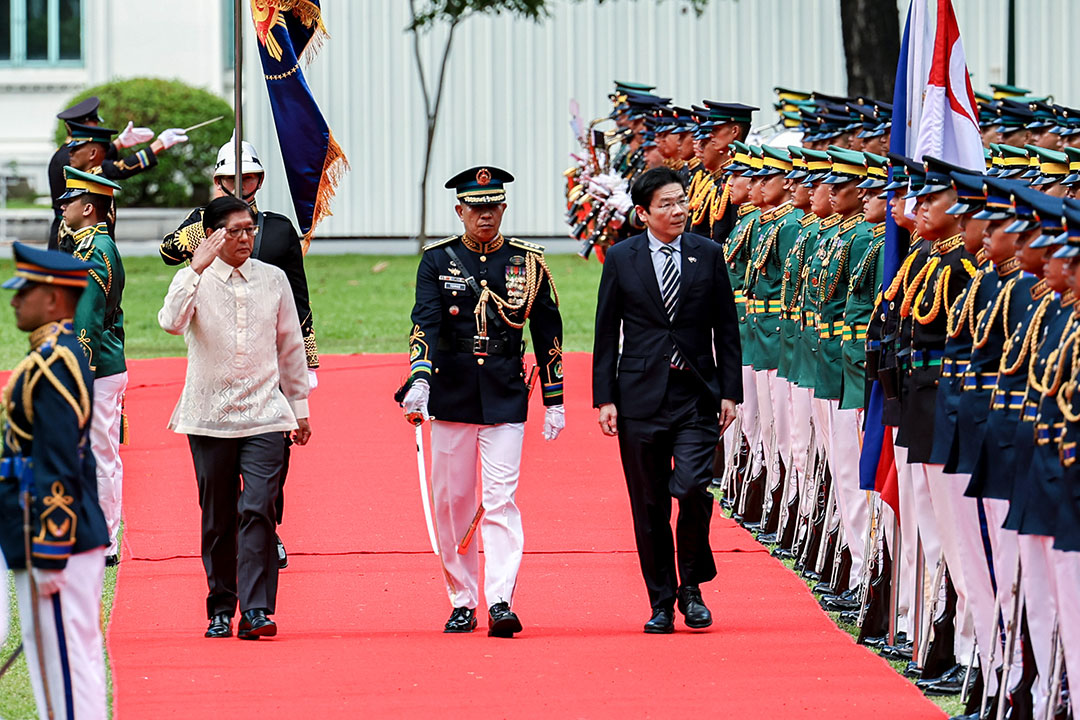PHL, SG eye deeper ties in energy, climate, digital governance and regional stability

PHILIPPINE President Ferdinand R. Marcos, Jr. and the Singaporean Prime Minister Lawrence Wong met in Manila on Wednesday for high-level bilateral talks focused on expanding cooperation in energy, climate resilience, digital governance, and regional stability.
Speaking at Malacañang, Mr. Marcos said the meeting with Mr. Wong underscores the strategic importance of the Philippines-Singapore (SG) relationship, which he described as “thriving” after more than five decades of robust diplomatic and economic engagement.
“I look forward to our discussions on health, humanitarian assistance and disaster relief, renewable energy, the environment, and other people-to-people exchanges,” the Filipino leader said. “These are vital and priority sectors for the development of our countries and for the region.”
Both leaders agreed to begin negotiations on a carbon credits mechanism, building on the Memorandum of Understanding signed in August 2023 and reaffirming their commitments under the Paris Agreement.
The agreement aims to enable commercial participation in carbon credit projects, spurring green investments, technology transfer, and job creation.
“It is hoped that the early completion of the negotiations will result in climate-friendly actions and increased investments in related sectors, thereby creating meaningful and sustainable livelihood and business opportunities for both Filipinos and Singaporeans alike, while producing good sustainability outcomes for our local communities,” he said.
He also urged Singapore to increase investments in the Philippines’ renewable energy sector, and expressed hopes that the two states will conclude their agreement on health cooperation.
The visit marks Mr. Wong’s first foreign trip after his reappointment last month. He will be in the country for two days.
Following the bilateral meeting, Mr. Wong said that Singaporean companies are keen to invest in renewable energy projects in the Philippines, particularly in solar and wind. He said the move is expected to generate economic opportunities for Filipinos while helping the country achieve its clean energy targets.
Both leaders also pledged to accelerate efforts towards realizing the ASEAN Power Grid to improve regional energy resilience and support a green transition.
Singapore also pledged to support the Philippines’ capacity-building efforts, including enhanced cooperation on human resource development and digitalization.
Notably, the National University of Singapore has developed a leadership program to support the Philippine Civil Service Commission’s digital transformation agenda, while organizations like the Masyak Foundation are actively involved in healthcare initiatives in Taguig City.
Moreover, the talks touched on the recent launch of the Digital Leadership Program, a project with the island nation that aims to train thousands of Filipino civil servants in digital competencies.
Mr. Marcos said the program reflected a shared vision to build “future-ready, inclusive, and innovation-driven” public services.
The two leaders reaffirmed their commitment to the Association of Southeast Asian Nations (ASEAN) Community Vision 2045, a long-term blueprint that seeks to transform Southeast Asia into a resilient and people-centered regional bloc.
“The Philippines looks forward to continuing to work alongside Singapore, a trusted neighbor, a dependable friend, and reliable partner,” he said, noting also that the Philippines will continue to advocate for a rules-based international order.
The leaders had met last month in Kuala Lumpur, Malaysia, at the ASEAN Summit, where they exchanged views on strategic developments in the region.
Mr. Wong called the visit “an honor,” underscoring the historic and strategic depth of the Philippines-Singapore partnership.
He noted that Singapore is now one of the largest foreign investors in the Philippines, with business confidence continuing to grow on the back of the country’s economic potential.
“We are keen to discuss how we can grow our collaboration in new and emerging areas, like the green economy and in sustainability,” Mr. Wong added.
He also expressed support for the Philippines’ upcoming 2026 ASEAN Chairmanship, calling it a pivotal opportunity to shape the bloc’s future. — Chloe Mari A. Hufana



